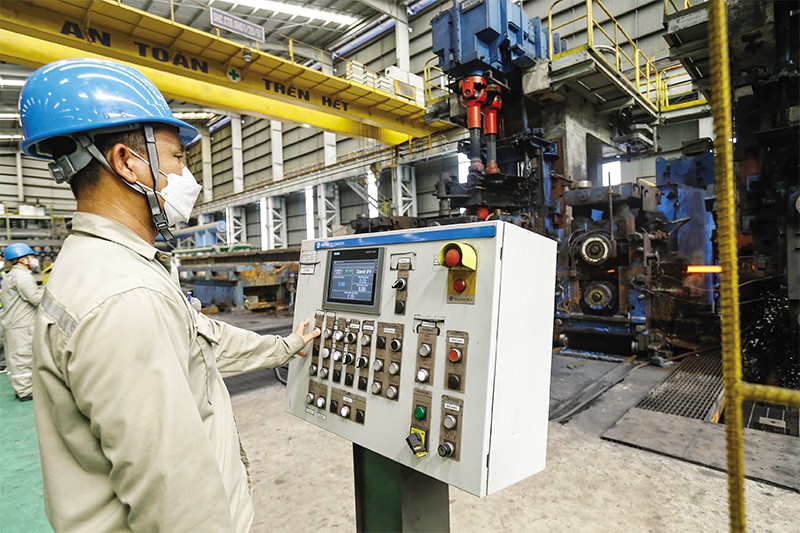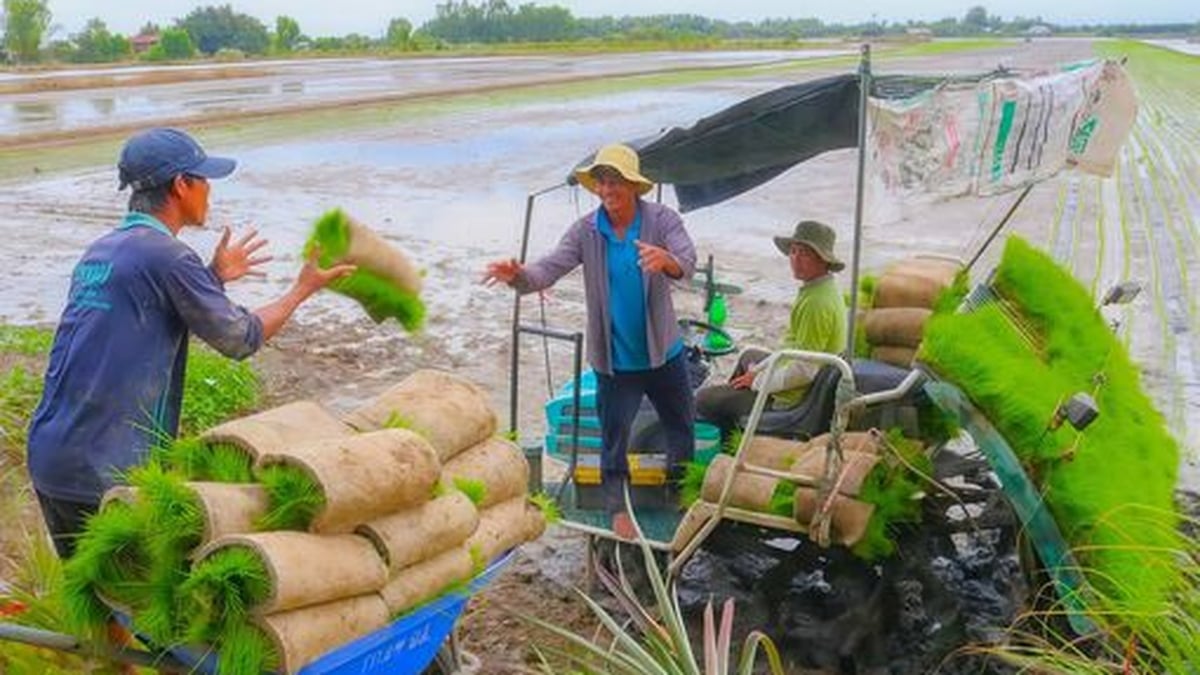Resolution No. 68-NQ/TW of the Politburo on private economic development (Resolution 68) affirms the central role of the private sector in economic development and opens a clear path towards an open, innovative and sustainable economy.
Since launching the Doi Moi reforms in 1986, Vietnam has made remarkable progress, becoming one of the most dynamic economies in Southeast Asia. A key player in this transformation has been the private sector, which now contributes about half of the country’s GDP, more than 30% of state budget revenues, and employs about 82% of the workforce.
Despite its important role, the private sector is still facing many challenges, such as the majority of enterprises being small and medium-sized, limited technological innovation capacity, and low labor productivity...
Realizing that, on May 4, 2025, the Politburo issued Resolution 68, marking a strong shift in the national development strategy.
This is a landmark resolution, promoting the private economic sector as the main growth engine and the nucleus for promoting innovation and digital transformation. The resolution proposes a series of comprehensive reforms to eliminate outdated prejudices, improve access to resources, and create a favorable business environment, encourage entrepreneurship and enhance competitiveness. Thereby, it not only creates recovery momentum for domestic enterprises, but also enhances Vietnam's attractiveness to foreign investment flows.

Creating a solid foundation for growth
Resolution 68 sets an ambitious goal of having 2 million active enterprises by 2030, the private sector contributing 55-58% of GDP and having at least 20 large enterprises deeply participating in the global value chain.
In addition, Vietnam aims to be among the top 3 ASEAN countries in terms of innovation and digital transformation capacity.
These targets not only send a strong message to foreign investors about Vietnam’s long-term growth potential, especially in high-tech and export-oriented industries, but also demonstrate the Government’s determination to build a knowledge-based economy that is resilient and closely linked to the global supply chain.
Increase access to essential resources
An important pillar of the Resolution is to improve access to land, finance and skilled labor - key factors to attract foreign direct investment (FDI). Access to finance will be expanded through credit priority for small and medium enterprises, technology start-ups and businesses pursuing green models and digital transformation. In parallel, new policies on human resource training will help narrow the gap in high-quality human resources. These changes contribute to creating a more investor-friendly environment, minimizing operational risks and strengthening Vietnam's competitive position as a regional FDI attraction hub.
While focused on FDI, these reforms will also benefit foreign portfolio investment (FII) inflows by improving the overall business environment. Better access to finance and an upgraded workforce will enable listed companies to grow more strongly, thereby increasing their attractiveness to foreign portfolio investors.
Legal reform and streamlining administrative procedures to enhance competitiveness
Resolution 68 aims to cut compliance costs by 30% and simplify administrative procedures related to land by 2025 - important steps to reduce the burden on businesses. In addition, the Resolution emphasizes the need to streamline the apparatus at all levels of government by simplifying processes, eliminating overlapping approvals and increasing transparency. To ensure consistency and fairness, the Resolution promotes the unified application of laws between the central and local levels, overcoming the situation of fragmented implementation.
Following those fundamental reforms, Resolution 68 also prioritizes the completion of the legal framework to support business models based on technology and digital platforms, focusing on financial technology, artificial intelligence, virtual assets, cryptocurrencies, e-commerce and related fields. Applying a legal framework and post-audit mechanism in line with international practices will help foreign enterprises experiment with new business models without facing major legal risks. This is especially relevant for FDI in the fields of fintech and artificial intelligence, where regulatory clarity is required. For example, transparent regulations on data management, sharing and security will help technology enterprises feel secure in operating and investing in data centers or cloud computing.
Resolution 68 could become a milestone that opens a new era, where Vietnam is not only a destination for great aspirations, but also a model of investor confidence and effective economic transformation.
Another highlight is the emphasis on data security and intellectual property protection - two factors that have been major concerns for foreign portfolio investors. By strengthening the protection mechanism for inventions and technology, Resolution 68 creates a more transparent and secure investment environment.
The resolution also prioritizes civil and administrative measures over criminal ones in handling corporate violations, helping to minimize legal risks and increase Vietnam’s attractiveness in the eyes of foreign investors. A clear delineation of legal responsibilities will strengthen investor confidence and encourage long-term commitment.
For FIIs, the Government is committed to upgrading and restructuring the stock market, developing the insurance market, and improving the legal framework for corporate bonds. These measures will expand and improve the quality of long-term, stable capital mobilization channels for the private sector, while increasing transparency and investor protection - key factors in attracting FIIs. Financial security measures will also be improved to create a stable investment foundation.
Promoting science, technology and sustainable development
One of the most progressive points of Resolution 68 is to emphasize the central role of science, technology, innovation and digital transformation in enhancing national competitiveness. This is an orientation in line with the global investment trend when foreign companies, especially in the technology and digital fields, always seek a supportive environment including high-quality human resources, intellectual property protection mechanisms and infrastructure for innovation.
Encouraging investment in research and development (R&D), digital platforms and green technology shows that Vietnam is aiming to become a regional knowledge investment hub. Start-ups in fintech, e-commerce, artificial intelligence and cryptocurrency are expected to be attracted by the young, tech-savvy population and strong start-up support policies. R&D centers can leverage domestic human resources to promote innovation, while smart manufacturing and Industry 4.0 projects will have the opportunity to develop in industrial parks upgraded with modern digital infrastructure.
As Vietnam transitions to a digital economy, FII inflows are expected to grow in tandem. Vietnam has the potential to attract more FII into technology companies and startups, especially those listed on the HoSE or the Unlisted Public Company Market (UPCoM). Investors are also looking for access to listed technology companies, software companies, and green energy pioneers. Resolution 68 acts as a bridge between FDI and FII by fostering a dynamic, future-ready business ecosystem.
Handbook for foreign investors
For foreign direct investors, the clearest path is to align with Vietnam’s new priorities such as technology, green energy, digital services, and sustainable industries. Establishing partnerships with domestic enterprises, investing in smart infrastructure, and leveraging industrial parks designed for innovation will be key. FDI projects that integrate ESG standards and focus on knowledge transfer are more likely to receive favorable policy support and streamlined regulatory processes.
Meanwhile, foreign portfolio investors should focus on businesses with good governance, innovation capabilities and long-term growth strategies, especially in sectors that benefit from policy reforms. Vietnam’s capital market is still developing and early participation in sectors such as fintech, clean technology and digital platforms will bring high profit potential. Investors should cooperate with domestic asset management companies and regularly update legal information to make timely and effective investment decisions.
From Aspiration to Action: The Road Ahead
Resolution 68 reaffirms the central role of the private sector in economic development and paves the way towards an open, innovative and sustainable economy. With FDI inflows forecast to reach around US$40 billion by 2025 and growing interest from international institutional investors, the Resolution demonstrates Vietnam’s strong commitment to realizing its strategic vision with concrete actions.
Unlike many previous directional policies, Resolution 68 is considered a commitment to real action. In the past, many ambitious plans have encountered difficulties in implementation due to fragmentation and institutional complexity. But 2025 brings a breath of fresh air, with strong structural reforms, such as the consolidation of ministries and sectors and the streamlining of the apparatus, helping the management system become more flexible and effective.
With a clear division of labor, reduced red tape, and better coordination between the central and local governments, Vietnam now has a solid foundation to turn political will into practical results. If this reform momentum continues, Resolution 68 could become a milestone that opens a new era, where Vietnam is not only a destination for great aspirations, but also a model of investor confidence and effective economic transformation.
Source: https://baolaocai.vn/khu-vuc-kinh-te-tu-nhan-viet-nam-truoc-buoc-ngoat-lon-post402559.html






























































































![[Infographic] In 2025, 47 products will achieve national OCOP](https://vphoto.vietnam.vn/thumb/402x226/vietnam/resource/IMAGE/2025/7/16/5d672398b0744db3ab920e05db8e5b7d)





Comment (0)